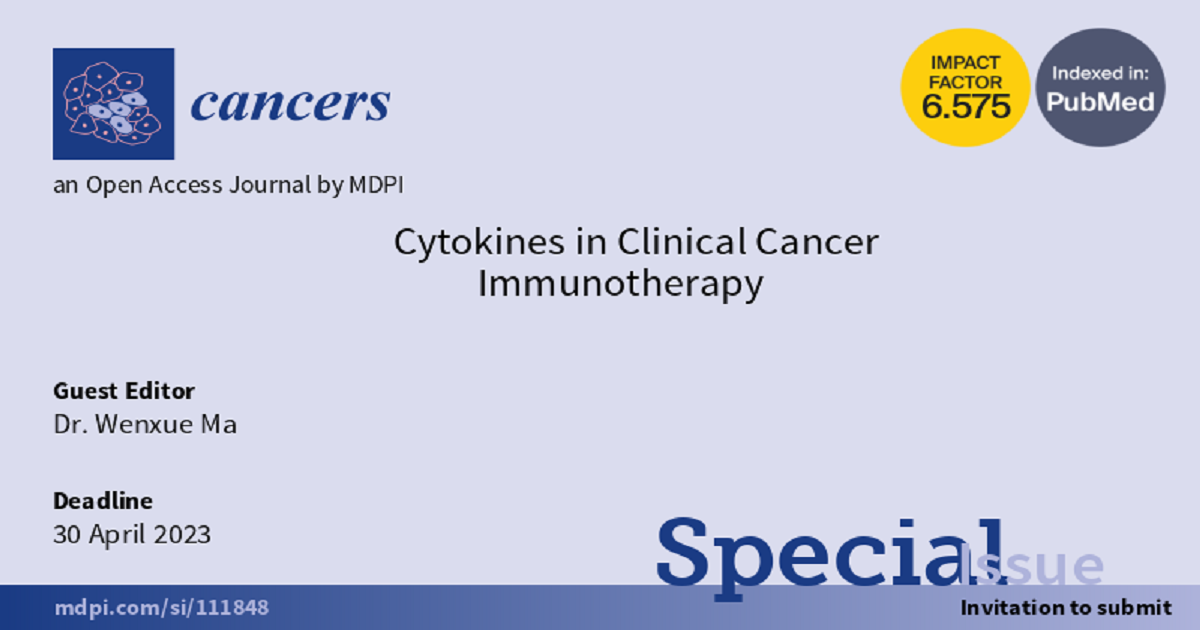Cytokines in Clinical Cancer Immunotherapy
A special issue of Cancers (ISSN 2072-6694). This special issue belongs to the section "Cancer Immunology and Immunotherapy".
Deadline for manuscript submissions: closed (30 April 2023) | Viewed by 13096

Special Issue Editors
Interests: cancer immunotherapy; tumor antigen; antigen presentation; tumor antigen-specific cytotoxic T lymphocytes (CTLs); tumor-infiltrating lymphocytes (TILs); tumor antigen delivery with nanotechnology; targeted cancer therapy; cancer stem cell (CSC); circulating tumor cell (CTC); biomarkers
Interests: immune checkpoints and cancer progression; immune escaping; immune responses; neoantigen presentation; T cell infiltration; microenvironmental factors; immune checkpoints; T cell activation; tumor progression; individualize immunotherapy
Special Issues, Collections and Topics in MDPI journals
Special Issue Information
Dear Colleagues,
The application of immunotherapy in clinical practice has significantly benefited cancer patients, particularly those with advanced disease. However, not all patients respond to immunotherapy. In combination with other regimens (e.g., chemotherapy, targeted therapy, and radiotherapy), improvement in patient survival suggests that interactions among immune cells, cancer cells, and microenvironments exist. Obtaining a better understanding of the potential mechanisms underlying these interactions, identifying the factors that affect these interactions and the efficacy of immunotherapy, evaluating the efficacy of combinations of different regimens, and identifying predictive and prognostic markers may help us to design better strategies for use in treatment and clinical practice. Current cancer immunotherapies include immune checkpoint inhibitors (ICIs), adoptive cell therapies (tumor-infiltrating lymphocytes (TILs), engineered T cell receptor therapy (TCR-T), CAR T cell therapy, and Natural Killer cell therapy), monoclonal antibodies, oncolytic virus therapy, cancer vaccines, and immune system modulators such as interleukins (IL) and interferons (IFN).
We are pleased to invite you to contribute to this special issue.
This Special Issue aims to publish not only reproduced experimental and theoretical results, but also meaningful but negative results so that other researchers do not need to repeat these experiments any longer within this scope. Both translational and clinical studies are welcome.
In this Special Issue, original research articles and reviews are welcome. Research areas may include (but are not limited to) the following: immune checkpoint inhibitors (ICIs), adoptive cell therapies (tumor-infiltrating lymphocytes (TILs), engineered T cell receptor therapy (TCR-T), monoclonal antibodies, and immune system modulators).
I look forward to receiving your contributions.
Dr. Wenxue Ma
Dr. Lingeng Lu
Guest Editors
Manuscript Submission Information
Manuscripts should be submitted online at www.mdpi.com by registering and logging in to this website. Once you are registered, click here to go to the submission form. Manuscripts can be submitted until the deadline. All submissions that pass pre-check are peer-reviewed. Accepted papers will be published continuously in the journal (as soon as accepted) and will be listed together on the special issue website. Research articles, review articles as well as communications are invited. For planned papers, a title and short abstract (about 100 words) can be sent to the Editorial Office for announcement on this website.
Submitted manuscripts should not have been published previously, nor be under consideration for publication elsewhere (except conference proceedings papers). All manuscripts are thoroughly refereed through a single-blind peer-review process. A guide for authors and other relevant information for submission of manuscripts is available on the Instructions for Authors page. Cancers is an international peer-reviewed open access semimonthly journal published by MDPI.
Please visit the Instructions for Authors page before submitting a manuscript. The Article Processing Charge (APC) for publication in this open access journal is 2900 CHF (Swiss Francs). Submitted papers should be well formatted and use good English. Authors may use MDPI's English editing service prior to publication or during author revisions.
Keywords
- cancer Immunotherapy
- immune checkpoint inhibitors (ICIs)
- tumor-infiltrating lymphocytes (TILs)
- engineered T cell receptor (TCR)
- Chimeric Antigen Receptor (CAR) T cells
- Natural Killer (NK) cells
- monoclonal antibodies
- cytokines
- clinical trial
- preclinical
Benefits of Publishing in a Special Issue
- Ease of navigation: Grouping papers by topic helps scholars navigate broad scope journals more efficiently.
- Greater discoverability: Special Issues support the reach and impact of scientific research. Articles in Special Issues are more discoverable and cited more frequently.
- Expansion of research network: Special Issues facilitate connections among authors, fostering scientific collaborations.
- External promotion: Articles in Special Issues are often promoted through the journal's social media, increasing their visibility.
- e-Book format: Special Issues with more than 10 articles can be published as dedicated e-books, ensuring wide and rapid dissemination.
Further information on MDPI's Special Issue polices can be found here.







